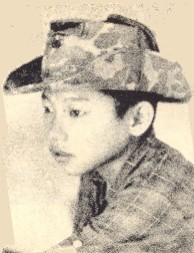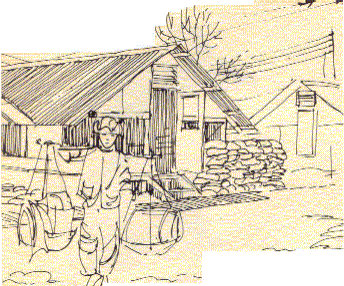The Vietnamization of Billy
Capt. J. Bruce Huffman
Cavalier 13 & 36
1968-69
This article appeared in ARMY
magazine November 1973.
Bread cast upon the waters has a way of
returning tenfold as two American plots found
out when they befriended a young Vietnamese boy.It was early October 1968 and the 1st Air Cavalry Division was on the move again. We had left our successful campaigns of Khe Sanh and A Shau behind and were on our way south to occupy that portion of South Vietnam's III Corps that shouldered Cambodia. I would be glad to see Phouc Vinh, our new home, on the horizon; seven continuous hours of helicopter flying time puts considerable stress on the hind quarters.
For the first time in our tours, we would finally have a place to live that we had not built ourselves from discarded rocket boxes and sandbags. We would have a hut with a tin roof and an officers club and maybe- just maybe- a shower with running water. These were the thoughts running through my mind as we shut down the engine on the OH-6A and looked over what was to be our new home.
Almost as son as the rotor had stopped turning and we were unstrapped, we were surrounded be a horde of young Vietnamese boys between the ages old six and 14. They all seemed to be speaking at once in broken english and Vietnamese, all trying to shine our boots "Numba One" and sell us a coke "beaucoup cheap".
We were unaccustomed to Vietnamese nationals because of the security regulation we had been living under forbidding any Vietnamese civilians to come within the confines of our encampments. It was truly a welcome thought that we would no longer have to shine our dusty boots nor wash our dirty flight suits in a bucket.
In the center of the crowd, and obviously the leader, was a boy about 12 years old. He had a beat up camouflage hat on his head and stood there shouting all sorts of unintelligible instructions to the younger boys. This was our first glimpse of the youngster who would later cause a big piece of our hearts to remain in Vietnam upon our return to America.
After that day we did not see very much of the local citizenry as we were busily occupied settling ourselves in our new home. Our hopes of running water had been shattered, but at least there was a club and semi-permenent quarters that offered some degree of relative comfort. We soon scrounged enough plywood and other materials to partition off our barracks bay into two-man cubicles, which we joyfully adorned with numerous questionable art objects and the latest centerfold from a well read magazine.
It did not take long for word to get out that the new Americans had pockets full of piasters and would welcome with open arms the shoeshine boys and laundry maids. Soon, our cubicle was the center of daily activity, with maids collecting laundry and shoeshine boys eagerly giving our combined four pairs of boots their daily treatment.
One day the boy we noticed earlier came to our cubicle with two younger ones in tow to negotiate with us to do our boots. The going price for a "numba six" shine (mediocre) was about 30 piasters. After much discussion, it was decided that for 50 Piasters we would get a "numba one" shine (excellent). My friend and I were both assigned aircraft and had not the time to to wait until our first shines were completed.
We told the oldest boy, whose name we learned was Billy, that we would pay him in an hour when we got back and to help himself to a cold soft drink if he wished.
That this was not the wisest courses under the circumstances neither of us realized until we were too close to our aircraft to turn and go back. Vietnamese children have acquired a bad reputation for stealing anything of value, an outgrowth of many years of war and suffering. The many orphans and homeless children, forced to forage and pilfer for their very existence, caused the reputation of theft to attach itself to all young Vietnamese.
Thankfully our suspicions proved to be unfounded. We returned after our mission to find four other boys in our room in addition to the ones who were there when we left. In the center of the room with his back to the refrigerator, stood Billy, his fists clenched and one eye bruised the color of coal. His two "friends" had fled the scene, leaving him to fight alone.
We discovered the four boys had entered our cubicle and had begun to go through our personal belongings. Billy had stood up to the largest of the four, who was bigger than he, telling him: "GI numba one! You no steal from GI". The larger boy did not heed the warning and Billy had proceeded to whale away at his back.
He was caught completely off guard, never expecting a fellow street boy to come to the aid of an American. The fight had then become rather one sided as the larger boy hit Billy square in the eye and his three friends joined in. We entered the room in the middle of the fracas and the four made a hasty retreat From that moment on, Billy became our first class friend.
After is encounter with the "slicky boys" Billy began to visit us regularly. We learned that his father had been part of a Vietcong cadre and had been killed by an American air strike, leaving Billy to support his sister and mother. Because of his father, his sympathies leaned a little toward the enemy, but since he depended on the Americans for his livelihood, he could not afford to align himself with either side. If he fought against the Americans, his sister and mother went without some extra food and if he fought for the Americans on the side of the South Vietnamese, the Vietcong cadre in the village would kill him. Such, we learned, was the state of Billy's confused young mind when we became friends.
We came to find that Billy was quite adept at the art of soldiering. Although he was only 12 he was able to take apart and reassemble all the small arms used by either side, including our own M-16s. But even though we were now good friends and talked quite freely with Billy there still lurked between us an element of distrust that we wished to erase.
We felt that exposing him to "forbidden" things was the best way to approach the problem, so we started leaving him alone in the room with a few rounds of live ammunition which we counted before we left the room and upon our return. None of the ammunition was ever missing, so we graduated to the regular ammunition plus some small change and later, piaster notes of considerable size. Even though he had little money of his own, he never disturbed the money we left to tempt him.
Gradually and ever so slowly, we could feel the bond of trust growing between us until we felt sure enough of ourselves to leave not only ammunition and the money but the weapon for the ammunition as well. This was something that we had never done before and he realized that this was the final step to sincere trust and confidence between us.
Time sped by toward the end of our 12 month tours and it seemed not long before it was time for our "Hail and Farewell". My roommate and I had been together since flight school and would be leaving Vietnam together, and we were planning quite a party. It would not be complete without Billy, so he was permitted to stay inside the compound after sunset with the approval of the CO. He had become more or less the unit protégé and was liked and trusted by everyone right up to the top of the squadron.
Our 'Hail and Farewell" party was rudely interrupted by a barrage of 107 mm rockets that impacted throughout our area, forcing us to seek the protection and safety of our bunkers. The atmosphere inside our shelter was not unlike a funeral service being held for a head of state in the confines of a closet. Everyone was somber in the overcrowded bunker with fear evident on everyone's face. Billy suddenly piped up in pidgin english, "Damn VC numbe ten thousand (worst possible) Rocket no good"
We all immediately had one hellava good laugh together and those endless seconds of fear passed, swallowed by the good humor of a 12 year old boy.
The day we left Phouc Vinh Billy was at the airfield to say good-bye. As tears rolled down his cheeks he stood at attention and saluted each of us and said in perfect english "Good-bye Number one friends".
The last view we had of him was standing there crying quietly as the rotor wash from our chopper bathed him in wind and dust.
We never had cause to regret the understanding we traded Billy for his friendship. We were to learn three years later that Billy is serving proudly with the South Vietnamese armed forces. We knew it could have turned out quiet differently if two pilots had not taken on the Vietnamization of Billy.

